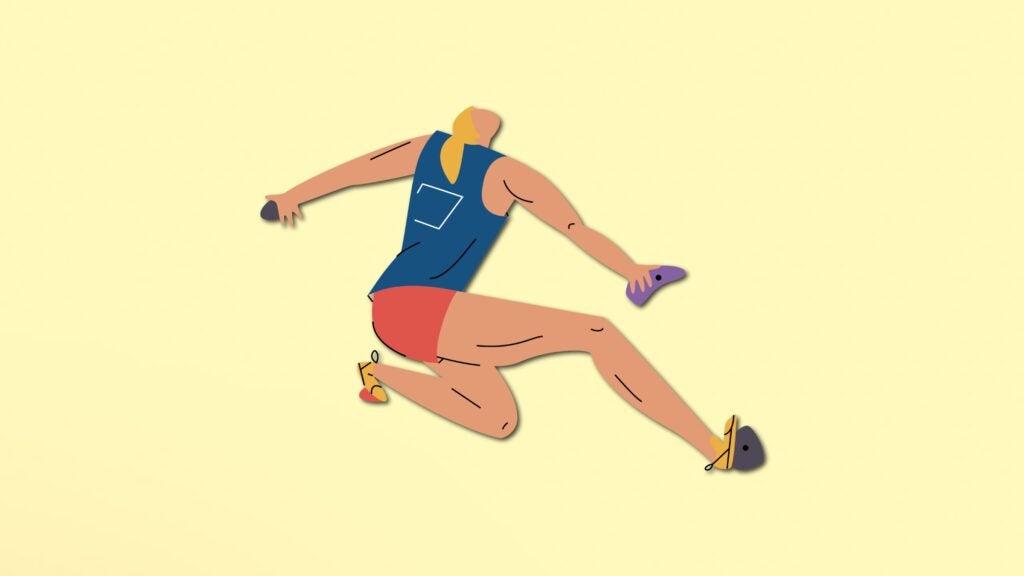Sports
I Want to Try a New Sport. But What If I Suck?

I’m an accomplished runner, and I’ve been wanting to try climbing at a facility near my apartment. I have no experience, but I’ve been watching videos online, and I think it’s something I would really like.
I’m used to running, which is a relatively private activity. Most of the time, nobody’s watching me. If they are, it’s because I’m in a race and performing at a fairly high level.
When I think about going to the gym, I get a pit in my stomach at the thought of people watching me be bad at climbing. I know everyone has to start somewhere, but I don’t want to slip and fall in front of other people. Or worse, I might get stuck, and be trapped up there while people watch me.
It seems like being athletic-looking makes it worse, because people will expect me to do well. How do I get over my embarrassment at trying something new?
For a while in college, I got into running. I was slow as heck, but I enjoyed it—which surprised me, since I’d always hated gym class. I headed out for an hour most mornings. For the first few weeks, I just walked, watching the sunrise through the trees. Then I tried jogging, starting with small goals: running for a minute or two, then walking until I caught my breath. Eventually I was able to run the whole time, even on huge hills. I was in the best shape of my life.
One day, I went on a date with a guy who was, like, a real runner. He was a college athlete, and he played sports in high school before that. He was fast and wiry. He made running look easy in a way that it had never, ever been for me.
We hit it off—at least, until the topic of a local 5K race came up. I mentioned that I might enter. I felt proud, saying it casually like that. I could run now! I was the kind of person who might enter a race on a whim!
He said that more people should enter. “Honestly,” he said, “if anyone out there can’t run three miles in a row, that’s pretty pathetic. Right?”
I froze. “Right,” I said. “Totally.” I wanted to disappear.
I was proud of my running, but I didn’t look down on the non-runner I was before. She had other priorities. She’d been doing just fine.
Still, I took the guy’s words at face value. He thought anyone who couldn’t run three miles was pathetic. I hadn’t been able to run three miles until recently—and it took me a lot of effort to get there. Therefore, if this guy really knew me, he would think I was pathetic.
I avoided him after that, so he’d never learn the truth.
Embarrassment and self-consciousness often stem from the idea that other people will think the same bad things that we already think—or fear—about ourselves. I was 20 years old, and though I worked hard to accept myself, I struggled with a fear that’s so common in young women: that there was something wrong or undesirable about my body, my shape, my looks. The idea that this guy saw something pathetic about my body—even if he didn’t realize it—cut deep.
But looking back, I think his statement may have been an attempt to cover up his own lack of confidence, too. Did he feel pressure to make running look easy? Was he afraid of losing fitness, and thus his identity as an athlete? Was he trying to impress me, or test me? Was there some part of him that hoped I would say I disagreed?
If you’re afraid that people may see you as a beginner, then your primary fear isn’t about other people. It’s about yourself. It’s about what being a beginner might mean about you. You’re not afraid that other people will be wrong about you. You’re afraid that they might see the truth.
If you’re afraid that people may see you as a beginner, then your primary fear isn’t about other people. It’s about yourself.
I don’t say this to diminish your accomplishments in any way. I have no doubt about your athletic ability, your talent, and your hard work. I just wish that you could feel as certain about those things as I do.
Building confidence is an ongoing process; there’s no easy fix. But in this case, I think that climbing may help you in more ways than one. It might be fun, yes—and even more importantly, it could help you realize that being bad at something doesn’t make you worth less. Your athleticism doesn’t disappear just because you lose your grip on a handhold. And your identity as an athlete doesn’t dissolve if you try a new and challenging sport. It might even get stronger.
If you’re still nervous, try going to the gym a few times and just observing. It’s great that you’ve been watching climbing videos, but the people you see on social media probably have years of experience. At the gym, climbers will have different body types and skill levels. They’ll slip. They’ll laugh. They’ll pick wedgies. Being there in person will make climbers seem less like icons and more like people. And once you see them as people, it’ll be easier to picture yourself as one of them.
Blair Braverman writes our Tough Love column. The top sports on her to-try list are long-distance paddling, kite skiing, and curling.








